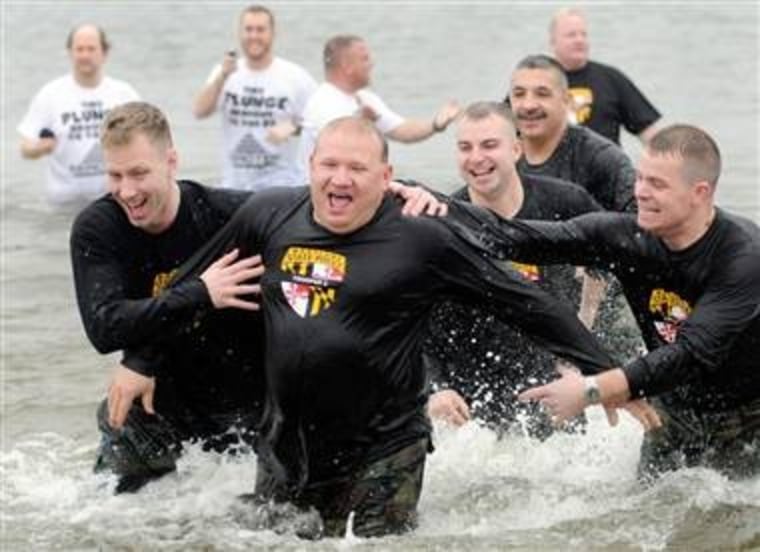While the rest of us are bleary-eyed and horizontal on New Year’s Day, 56-year-old Tom “Iceman” McGann of Brooklyn, N.Y., plans to charge into the frigid Atlantic Ocean wearing nothing but a bathing suit.
McGann and hundreds of other (totally insane) people will gather at the boardwalk on Stillwell Avenue in Brooklyn, N.Y., for the annual Coney Island Polar Bear Plunge. It’s one of many similar dips taking place on New Year’s Day and throughout the winter. Most raise money for charity, and most usually draw plenty of “are they crazy?” media coverage.
Immersing your scantily-clad body in ice-cold water may give you serious bragging rights. But does it pose any risks -- or offer any benefits -- for your health? The Finns (and Norwegians, and Russians) sure think so. All over Northern Europe, folks like to finish off a stint in the sauna with a plunge in any icy lake, touting the benefits the cold water has on the immune system, the complexion --even the libido.
Dr. Alan Steinman, one of the country’s foremost experts on hypothermia and cold-water survival, is dubious about those claims. “I don’t know of any definitive medical studies that have been done to measure the health benefits of cold-water swimming,” he says.
What’s more, plunging into cold water has some real risks, says Steinman, who served as the Coast Guard’s director of health and safety from 1993 to 1997. When the body is suddenly immersed in icy water, there’s a sudden gasp, an inhalation, rapid breathing and the inability to hold your breath, “which can be a problem if your head’s underwater,” he says. For that reason, it’s better to “plunge” gradually, from shallow water, and not off a dock or a boardwalk.
Physiologically, he explains, your body responds to a cold plunge in three ways: First, the small blood vessels constrict on the surface of your body as a defense mechanism, so you don’t lose heat. That means that a whole lot more blood is being squeezed into the same amount of blood vessels, which “serves to increase the effect on blood pressure,” he says.
Next, blood rushes from extremities to the core, chilling the limbs and leading to weakness and impaired motor coordination. That's why people rescued from accidental plunges into icy water have trouble grabbing life rings or ropes from rescuers.
Finally, true hypothermia sets in, typically after more than 30 minutes of immersion. That's when core body temperature plunges below normal. If it falls far enough, hearbeat may be disrupted and breathing may fail, causing death.
The early stage of the process, cold shock response, happens to everyone -- even “Iceman” McGann, who admits, “you never get used to it.” But the danger comes if you have heart disease, and are prone to irregular heartbeat or cardiac arrest. “The potential medical problems are relatively infrequent, but it’s possible,” says Steinman.
In the 14 years since its inception, the Maryland State Police Polar Bear Plungefest hasn’t had a single medical incident -- which is pretty astounding when you consider that the event drew 12,000 participants last year.
“We have a very solid safety plan in place,” says event spokesperson Kelley Schniedwind, who adds that they’ve partnered with the world-class Johns Hopkins emergency medical team for support at the event. Participants are also not allowed to stay in the water longer than five minutes, which is enforced by the 75-some-odd divers that patrol the waters at Sandy Point State Park, in Annapolis.
The event raises money for the Special Olympics, so there’s definitely a feel-good aspect about feeling the 35-degree chill of the Chesapeake. The Coney Island Polar Bear Plunge, which McGann will tackle for the 20th time on Saturday, asks participants to donate to Camp Sunshine, a retreat for children with life-threatening illnesses.
But “Iceman” McGann doesn’t just dip for charity -- he dips throughout the winter, as his nickname might suggest. “It’s exhilarating, it’s refreshing, it’s a rebirth. I just like doing it. I like being outside,” he explains. “It’s fun to do alone, but it’s more fun to do with other people. You can yell and scream, and where else can you yell and scream in today’s world?”
